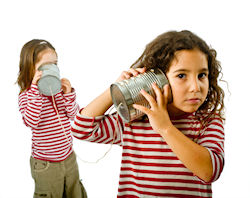Listen for Feelings
— Dr. James R. Kok
I spotted a large iguana in our back yard a few months ago.
In forty years of life in Southern California, I had never seen such a strange looking, living reptile in the family yard. They are scary looking creatures, with their row of spines from neck to tail, but they are harmless lizards that feed on insects and vegetation.
My excitement and awe spilled over in several conversations during the next few days. I wanted to tell people about my unusual encounter with, what for me, was a rare animal. Mild animal-lover that I am, this tiny speck of wildlife had thrilled me. Sharing the experience, however, turned out to be a let-down.
One friend that I told said nothing, as if waiting for the rest of the story. She then admitted it meant nothing to her. It was as if I had told her I had seen a Sparrow.
Another acquaintance quickly informed me that he sees one in his yard from time to time. (He lives 90 miles east, close to the desert, where these animals normally live.) In other words, he said, “So what?”
 Most others quickly went into their own stories of surprising encounters. One was a coyote, one a hawk, another a bluebird. Of the half dozen friends I told, no one showed delight over my little thrill. Not one tuned into my pleasant experience with energy and interest.
Most others quickly went into their own stories of surprising encounters. One was a coyote, one a hawk, another a bluebird. Of the half dozen friends I told, no one showed delight over my little thrill. Not one tuned into my pleasant experience with energy and interest.
What would I have liked? Probably something like this: “Oh really, how exciting. Did you take a picture?” Such a response would allow me to say more, and that would recharge my adrenaline rush a little. A little fascination would have been greatly into their stories, or I just hit a wall of “Ho hum”.
My disappointment, though unimportant in itself, is part of a relatively important issue. Loving-kindness in communication calls for the hard work of responding on target. This means hearing and recognizing where the talker is when they share an anecdote or experience, whether large or small.
The first thing that quite normally comes to our mind in response to another’s experience or story is usually not the place we should go. That is what is loosely called ”free association”. Everybody’s story, or delight, reminds us of something else. Immediately, a thought comes to mind but, most often, it should be set aside.
For example, I quickly run with word associations. So when I hear the word “iguana” spoken, it immediately triggers some humorous word play in my mind. So I might say, “I guana see one someday”.
Another person might recall a scary confrontation with such an animal or lizard. The surprise quality of the iguana sighting easily brings up other people’s unexpected spotting of wildlife. They then move into their own story.
Listen With Your Third Ear
There is another organ that we must bring in to this drama. Our normal two ears hear words. Our third ear hears feelings. We quickly focus on the words but the most important sound is probably nearly inaudible. The unheard sounds are the emotions behind the words or surrounding them. The third ear hears those feelings.
For example, if I say to you, “Our cat died,” you hear a three word factual statement about a cat. It may have been spoken with absolutely nothing more than a flat voice. If you settle for what your two ears heard, you could conclude it was on the level of “A book dropped.” Your third ear hears more, however: sorrow, grief, loss. The caring person goes there and says “Oh, that is sad.”
Back to the iguana: The tone of my voice when speaking about it may have been relatively unfeeling. But the “third ear” listener would realize and hear more than I am saying. “Wow! That is unusual.” Or “It is such fun to see wildlife in our own backyards, isn’t it?”
So the formula for care-full listening calls for activating that third ear, which consistently asks—what is the feeling here? And then responds on that note.